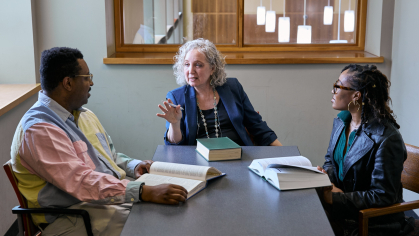A Milestone in Youth Mental Health Healing and Recovery
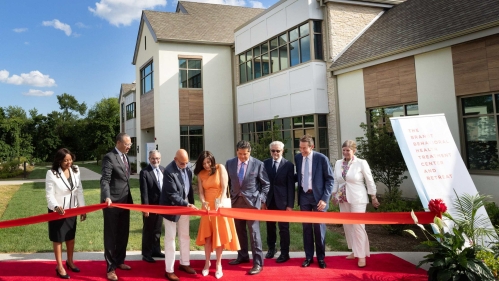
Ribbon-cutting ceremony at Rutgers University celebrates New Jersey’s first youth mental health facility backed by a university or college. The Brandt Behavioral Health Treatment Center and Retreat strives to fill a glaring need in the ongoing crisis of youth mental health.
Nearly a decade ago, Marlene Brandt’s youngest daughter burst into sorrowful tears after leading her college volleyball team to a championship and winning the tournament’s most valuable player award.
“Soon the tears dissolved into an unending waterfall,” said Brandt. “They did not stop.”
Brandt began a “long and harrowed search for answers” to rescue her daughter Casey from an “emotional abyss.” It wasn’t until after a months-long series of inadequate treatments that she found an effective out-of-state program 250 miles away from the family’s home in New Jersey.
The program nurtured her daughter and supported a full recovery. “She became an even better version of her previous self,” Brandt said.
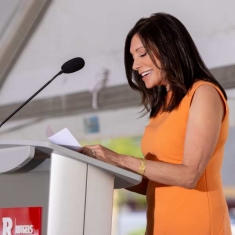
Brandt, a Rutgers College alumna who in 2019 announced a $30 million gift to Rutgers to establish the Brandt Behavioral Health Treatment Center and Retreat, shared her personal story with New Jersey leaders, Rutgers administrators, faculty, staff, and donors, and health care leaders at a ribbon-cutting ceremony on Monday celebrating the completion of the innovative center on Rutgers’ George H. Cook campus in New Brunswick.
“I am a mother who realizes that overwhelming gratitude is just not enough,” Brandt said. “I realized that I had the ability and determination to bestow this same gift on many other families who are confronting similar arduous struggles.”
The Brandt Center is expected to open in the next academic year and will serve an estimated 1,200 youth and young adults annually. It will combine health care and evidence-based scholarly research, strengthen the partnership between Rutgers’ health care professionals and the communities they serve, and help train the next generation of behavioral health care providers. The facility is the first in New Jersey backed by an academic health leader to offer mental health treatment exclusively for adolescents and young adults.
The need for the Brandt Center is clear: Centers for Disease Control studies indicate that more than one in five adolescents has seriously considered suicide, with young adults ages 18 to 25 particularly vulnerable. Data reveals a steep rise in rates of depression, anxiety, loneliness, and suicide since COVID-19 first emerged, particularly in young people.
“Today marks a wonderful milestone in creating not only an important place of healing and recovery, but an equally vital university initiative,” Rutgers University President Jonathan Holloway said. He added that the Brandt Center fulfills the university’s core values of “access to academic excellence, building community, and the common good. All of these values are on display today in full force.”
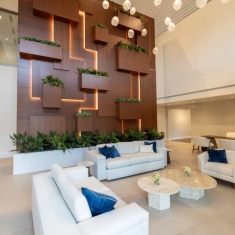
The ribbon-cutting ceremony included tours of the new facility’s two buildings, known as the Blau Wellness Center and the retreat, which include rooms for art and music therapy and a mind body studio that allow for dance and yoga therapies. The retreat, which includes private rooms for up to 16 guests, also hosts a fitness center. The pastoral site, which is near the university’s agricultural research facility and borders horse pastures of the Rutgers Equine Research Facility, also plans to offer equine and horticulture therapies.
“We are taking an overall holistic approach to wellness,” said Micah Hillis, director of the Brandt Center.
New Jersey Commissioner of Health and Human Services Sarah Adelman said the benefits of the Brandt Center will be significant.
“The Brandt Behavioral Health Treatment Center and Retreat is an opportunity for New Jersey’s families to receive world-class care, including outpatient support, right here in the Garden State,” Adelman said. “We know early detection, prevention, and treatment of mental illness save lives.”
Frank A. Ghinassi, Rutgers University Behavioral Health Care President and CEO and SVP for Behavioral Health Services at RWJBarnabas Health, emphasized the tremendous need for array of innovative services the Brandt Center offers.
“This helps us to do something that’s critical, and that’s to provide the right care in the right setting at the right time,” said Ghinassi, a licensed clinical psychologist who also is professor at the Rutgers Graduate School of Applied and Professional Psychology (GSAPP). “These young people who pass through these buildings—they’re our future.”
Mark E. Manigan, President and Chief Executive Officer for RWJBarnabas Health, said the Brandt Center further expands the existing partnership between Rutgers Health and RWJBarnabas Health in many positive ways.
“RWJBarnabas Health is proud of our partnership with Rutgers and Rutgers University Behavioral Healthcare,” Manigan said. “The Brandt Center will become the gold standard for the provision of evidence-based, compassionate mental healthcare and support for young people.”
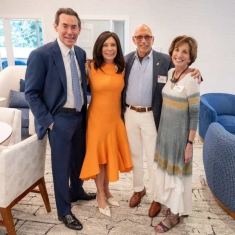
Allan Blau—a 1963 graduate of Rutgers who in April announced a generous gift to support the Rutgers Youth Behavioral Health Initiative and establish graduate student fellowships—said his support of the Brandt Center is an extension of his life’s work, which is rooted in his Jewish heritage.
“I have spent my entire professional career, which has been nearly 60 years, working with and in one way or another, taking care of children,” Blau said, citing the Jewish concept of Tzedakah as the foundation for his work. For him it means "taking care of those who cannot take care of themselves."
The Rutgers Board of Governors in April approved naming the Blau Wellness Center within the Brandt Center complex after him. Blau’s gift also will support the creation of a fellowship program that will allow students to work and train in the state-of-the-art facility. He said that research and scholarship will be disseminated and “be a significant part in repairing the mental health of the world.”
Rutgers–New Brunswick Chancellor Francine Conway, an accomplished scholar and clinical psychologist internationally recognized for her work in child psychopathology, has been a champion of the Brandt Center from the earliest planning stages.
“This is a landmark day in New Jersey for young people who desperately need the care the Brandt Center will provide,” said Conway, a Distinguished Professor at GSAPP who served as the school’s dean from 2016 through 2020. “The broad spectrum of the university's clinical and research capacity and the comprehensive range of services will enable a continuum of care—the full arc of treatment—that few other centers in the world can offer.”
In addition to Brandt and Blau, Brandt Center donors include the Robert Wood Johnson Foundation, the Tepper Foundation, and Rutgers alumni Gary and Barbara Rodkin.
Erica Haller, a Rutgers alumna who is a donor to the program, attended the ribbon-cutting ceremony Monday. After her oldest daughter, Jordan, died by suicide in December 2022 at age of 20, Haller learned about plans for the Brandt Center and Retreat. Haller—who directs Jordan’s Relay, which supports “mental health awareness through a community of caring moms”—and her family made a gift to the Brandt Center to name a music therapy room at the facility for her oldest daughter.
“I’m sharing my story because a lot of people don’t talk about it, and that’s a big part of the problem,” Haller said. “Every time I speak out, moms reach out to me privately and say, ‘I’m going through this with my child.’ There are people who are suffering, and the Brandt Center is going to provide the level of care that I was not able to obtain for my daughter.”
For additional photos of the Brandt Center and the ribbon-cutting ceremony, visit the photo slide show.
To support the Rutgers Youth Behavioral Health Initiative, please visit the web page or contact Sharon Cocuzza, associate vice president of development for Rutgers–New Brunswick at sharon.cocuzza@rutgersfoundation.org, 848-932-1699, or Marilyn McGhee, director of development, Rutgers University Behavioral Health Care, at marilyn.mcghee@rutgersfoundation.org, 732-235-6595.
For information about services provided, contact Micah Hillis, director of the Brandt Center, at 732-235-5000, micah.hillis@rutgers.edu.
Support the Brandt Center
Please consider a gift to support the Brandt Behavioral Health Treatment Center and Retreat.
Give Now